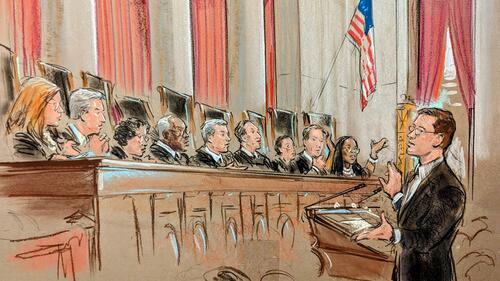Below is my column in the New York Post on yesterday’s oral arguments on presidential immunity. As expected, with the exception of the three liberal justices, the Court appears to be struggling to find a more nuanced approach that would avoid the extreme positions of both parties. Rather than take a header off either cliff, the justices seem interested in a controlled descent into the depths of Article II.
Here is the column:
Writer Ray Bradbury once said, “Living at risk is jumping off the cliff and building your wings on the way down.”
In Thursday’s case before the Supreme Court on the immunity of former President Donald Trump, nine justices appear to be feverishly working with feathers and glue on a plunge into a constitutional abyss.
It has been almost 50 years since the high court ruled presidents have absolute immunity from civil lawsuits in Nixon v. Fitzgerald.
The court held ex-President Richard Nixon had such immunity for acts taken “within the ‘outer perimeter’ of his official responsibility.”
Yet in 1974’s United States v. Nixon, the court ruled a president is not immune from a criminal subpoena. Nixon was forced to comply with a subpoena for his White House tapes in the Watergate scandal from special counsel Leon Jaworski.
Since then, the court has avoided any significant ruling on the extension of immunity to a criminal case — until now.
There are cliffs on both sides of this case.
If the court were to embrace special counsel Jack Smith’s arguments, a president would have no immunity from criminal charges, even for official acts taken in his presidency.
It would leave a president without protection from endless charges from politically motivated prosecutors.
If the court were to embrace Trump counsel’s arguments, a president would have complete immunity.
It would leave a president largely unaccountable under the criminal code for any criminal acts.
The first cliff is made obvious by the lower-court opinion. While the media have largely focused on extreme examples of president-ordered assassinations and coups, the justices are clearly as concerned with the sweeping implications of the DC Circuit opinion.
Chief Justice John Roberts noted the DC Circuit failed to make any “focused” analysis of the underlying acts, instead offering little more than a judicial shrug.
Roberts read its statement that “a former president can be prosecuted for his official acts because the fact of the prosecution means that the former president has acted in defiance of the laws” and noted it sounds like “a former president can be prosecuted because he is being prosecuted.”
The other cliff is more than obvious from the other proceedings occuring as these arguments were made. Trump’s best attorney proved to be Manhattan District Attorney Alvin Bragg.
If the justices want insight into the implications of denying any immunity, they just need to look north to New York City.
The ongoing prosecution of Trump is legally absurd but has resulted in the leading presidential candidate not only being gagged but prevented from campaigning.
Alvin Bragg is the very personification of the danger immunity is meant to avoid.
With cliffs to the left and the right, the justices are looking at a free-fall dive into the scope of constitutional and criminal law as they apply to presidential conduct.
They may be looking not for a foothold as much as a shorter drop.
Some of the justices are likely to be seeking a third option where a president has some immunity under a more limited and less tautological standard than the one the DC Circuit offered.
The problem for the court is presidential privilege and immunity decisions are meant to give presidents breathing room by laying out bright lines within which they can operate.
Ambiguity defeats the purpose of such immunity. So does a test that turns on the motivation of an official act.
The special counsel insists, for example, Trump was acting for his personal interest in challenging certification and raising electoral fraud since he was the other candidate.
But what if he wasn’t on the ballot — would it have been an official function to raise such concerns for other candidates?
When pressed on the line between official and nonofficial conduct, the special counsel just dismissed such concerns and said Trump was clearly acting as an office-seeker not an officeholder.
Likewise, the special counsel argued the protection for presidents must rest with the good motivations and judgment of prosecutors.
It was effectively a “Trust us, we’re the government” assurance. Justice Samuel Alito and others questioned whether such reliance is well placed after decades of prosecutors’ proven abuses.
Finally, if there is no immunity, could President Barack Obama be prosecuted for ordering the killing of a citizen by drone attack and then killing his son in a second drone attack?
The government insisted there is an exception for such acts from the murder statute.
In the end, neither party offers a particularly inviting path. No immunity or complete immunity each holds obvious dangers.
I have long opposed sweeping arguments of immunity from criminal charges for presidents. The devil is in the details, and many justices are struggling with how to define official versus nonofficial conduct.
The line-drawing proved maddening for the justices in the oral argument. The most they could say is similar to the story of the man who jumped off a building. As he passes an office window halfway down, another man calls out to ask how he’s doing. The jumper responds, “So far so good.”
As the justices work on a new set of legal wings, anything is possible as the nation waits for the court to hit ground zero in the middle of the 2024 presidential election.
